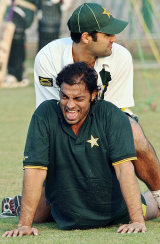lost in the desert
 Nicholas Kristof has written an interesting piece in the New York Times on the common stereotypes about Islam. In it, he argues that no "religion's influence is intrinsically peaceful or violent," but admits that "some Muslim societies do have a real problem with violence, wih the subjugation of women, with tolerance."
Nicholas Kristof has written an interesting piece in the New York Times on the common stereotypes about Islam. In it, he argues that no "religion's influence is intrinsically peaceful or violent," but admits that "some Muslim societies do have a real problem with violence, wih the subjugation of women, with tolerance."
His main point is that Muslims exist across the world, and subsequently the practise of Islam spans too broad a spectrum to be so easily summarized. In fact, "The mosaic of Islam", he says, "contains many hopeful glimpses of the future."
He cites a Muslim in Brunei who implies that the problem is not with Islam, but with 'Arab' Islam. By putting it this way, Mr. Kristof simplifies the problem by breaking it up geographically: Asian Islam is like this, and Arab (or more specifically, Saudi) Islam is like that. This is partly true. Local culture and history do tend to play a large role in the way the religion is practised. But that's not the whole story.
The trouble with Saudi Islam is that it, moreso than its counterparts, is so opposed to updating its rituals in any way that integrating its followers with the rest of the world is becoming increasingly difficult. As a smart Muslim once pointed out to me, it "needs to be dragged kicking and screaming into the 21st century."
What Mr. Kristof fails to point out, however, is that Saudi Islam, as the supposed purveyor of the faith, has a significant influence on other varieties, regardless of geography. Pakistani Islam, for example, often uses the Saudi model as a yardstick, unwilling as it is to carve out its own identity.
What's left is a problem that is exported out of Saudi Arabia into other parts of the world. The Saudis are quick to justify everything they do in the name of Islam, making it hard for Muslims everywhere, especially less educated ones, to deny their alliegance to some pretty dastardly things. The result is that many Muslim societies, among which Pakistan is a shining example, are sharply divided along educational, not geographic, lines.
Mr. Kristof drives home his point with a slightly melodramatic comment:
There is a historic dichotomy between desert Islam — the austere fundamentalism of countries like Saudi Arabia — and riverine or coastal Islam, more outward-looking, flexible and tolerant. Desert Muslims grab the headlines, but my bet is that in the struggle for the soul of Islam, maritime Muslims have the edge.
So what about places like Karachi, that are, quite literally, both maritime and desert at once?










 RSS
RSS